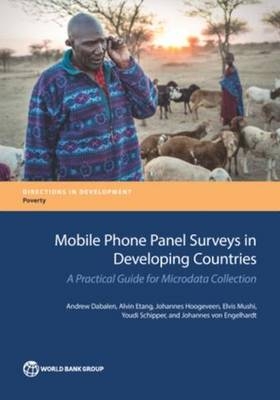
Mobile phone panel surveys in developing countries
a practical guide for microdata collection
Seiten
2016
World Bank Publications (Verlag)
978-1-4648-0904-0 (ISBN)
World Bank Publications (Verlag)
978-1-4648-0904-0 (ISBN)
- Lieferbar (Termin unbekannt)
- Versandkostenfrei innerhalb Deutschlands
- Auch auf Rechnung
- Verfügbarkeit in der Filiale vor Ort prüfen
- Artikel merken
Thoroughly documents an innovative approach to data collection in developing countries, which combines baseline data from a household survey with subsequent interviews of selected respondents using mobile phones.
Household survey data are very useful for monitoring living conditions of citizens of any country. In developing countries, a lot of this data are collected through "traditional" face-to-face household surveys. Due to the remote and dispersed nature of many populations in developing countries, but also because of the complex nature of many survey questionnaires, collection of timely welfare data has often proved expensive and logistically challenging. Yet, there is a need for faster, cheaper to collect, lighter, more nimble data collection methods to address data gaps between big household surveys. The recent proliferation of mobile phone networks has opened new possibilities. By combining baseline data from a traditional household survey with subsequent interviews of selected respondents using mobile phones, this facilitates welfare monitoring and opinion polling almost real time. The purpose of this handbook is to contribute to the development of the new field of mobile phone data collection in developing countries. The handbook documents how this innovative approach to data collection works, its advantages and challenges. The handbook draws primarily from the authors' first-hand experiences with mobile phone surveys in Africa and also benefits from experiences elsewhere. It is intended to serve a diverse audience including those involved in collecting (representative) data using mobile phones, and those using data collected through this approach. For those who will be implementing a mobile phone panel survey, the different chapters guide them through every stage of the implementation process. For potential users of the data collected via mobile phone technology, the handbook presents a new approach to data collection which they can use for monitoring programs and facilitate almost real time decision-making. A further purpose of this book is to contribute to the debate regarding the advantages of the method as well as the challenges associated with it.
Household survey data are very useful for monitoring living conditions of citizens of any country. In developing countries, a lot of this data are collected through "traditional" face-to-face household surveys. Due to the remote and dispersed nature of many populations in developing countries, but also because of the complex nature of many survey questionnaires, collection of timely welfare data has often proved expensive and logistically challenging. Yet, there is a need for faster, cheaper to collect, lighter, more nimble data collection methods to address data gaps between big household surveys. The recent proliferation of mobile phone networks has opened new possibilities. By combining baseline data from a traditional household survey with subsequent interviews of selected respondents using mobile phones, this facilitates welfare monitoring and opinion polling almost real time. The purpose of this handbook is to contribute to the development of the new field of mobile phone data collection in developing countries. The handbook documents how this innovative approach to data collection works, its advantages and challenges. The handbook draws primarily from the authors' first-hand experiences with mobile phone surveys in Africa and also benefits from experiences elsewhere. It is intended to serve a diverse audience including those involved in collecting (representative) data using mobile phones, and those using data collected through this approach. For those who will be implementing a mobile phone panel survey, the different chapters guide them through every stage of the implementation process. For potential users of the data collected via mobile phone technology, the handbook presents a new approach to data collection which they can use for monitoring programs and facilitate almost real time decision-making. A further purpose of this book is to contribute to the debate regarding the advantages of the method as well as the challenges associated with it.
| Erscheinungsdatum | 22.07.2016 |
|---|---|
| Reihe/Serie | Directions in development |
| Zusatzinfo | col. figs, tables |
| Verlagsort | Washington |
| Sprache | englisch |
| Themenwelt | Informatik ► Datenbanken ► Data Warehouse / Data Mining |
| Sozialwissenschaften ► Kommunikation / Medien ► Journalistik | |
| Technik | |
| Wirtschaft ► Betriebswirtschaft / Management | |
| Wirtschaft ► Volkswirtschaftslehre ► Makroökonomie | |
| ISBN-10 | 1-4648-0904-6 / 1464809046 |
| ISBN-13 | 978-1-4648-0904-0 / 9781464809040 |
| Zustand | Neuware |
| Haben Sie eine Frage zum Produkt? |
Mehr entdecken
aus dem Bereich
aus dem Bereich
Datenanalyse für Künstliche Intelligenz
Buch | Softcover (2024)
De Gruyter Oldenbourg (Verlag)
74,95 €
Auswertung von Daten mit pandas, NumPy und IPython
Buch | Softcover (2023)
O'Reilly (Verlag)
44,90 €


